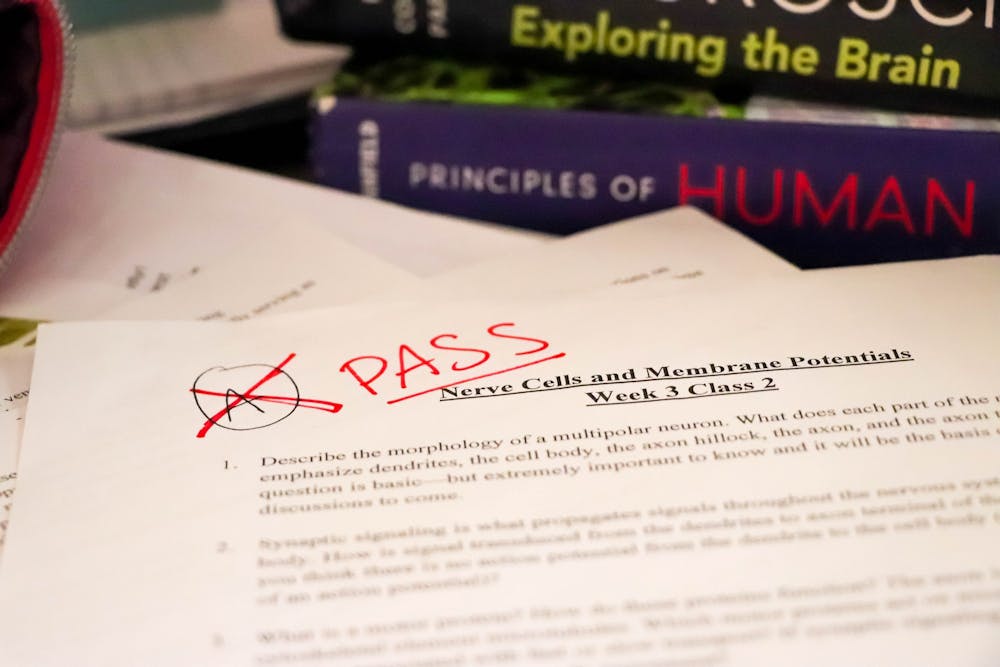
Provost Wendell Pritchett announced Friday that Penn is adopting a new grading policy which allows undergraduates to opt in to take any course pass/fail, including ones that fulfill major and general education requirements, without counting towards the total number of pass/fail courses a student may take over four years. While these changes are a positive step, they do not go far enough. In light of an unprecedented disruption to daily life and student coursework due to the coronavirus, Penn must switch immediately to a universal pass/fail policy.
Peer institutions, including the Massachusetts Institute of Technology, Columbia University, and Smith College, have already taken this step. A universal policy would account for the uneven effect the crisis has on Penn students, the ability to apply for post-graduate programs without penalization, and the variability in how professors will adapt to this new medium of teaching.
While at Penn, students have access to many of the same resources — quiet work environments, stable housing, computers, and internet access. The transition to remote learning means this is no longer the case. It is unfair to allow those in more privileged environments to take classes that boost their GPAs while some of their peers face a number of serious obstacles. Many Penn students will be working in shared spaces, helping care for family members, buying groceries for their households, dealing with family finances, or struggling with illness themselves. The current opt-in policy does not mitigate this inequality. It puts vulnerable students at a disadvantage to their peers who are able to prioritize academics.
Grades should not be at the forefront of any student’s mind in a public health crisis. Without a universal policy, however, students are incentivized to take courses for a letter grade. Outside scholarships and post-graduate programs typically expect transcripts with letter grades in the application process, leading many students to take courses for a grade if the option is available. If the pass/fail policy were universal, these external programs would not be able to penalize students for taking courses pass/fail. MIT already requires first-year students to take certain classes pass/fail, and they are not at a disadvantage for post-graduate programs because of it. Harvard Medical School has already agreed to accept students who take prerequisite classes pass/fail during these extraordinary circumstances provided it was mandated by their university, and other programs are likely to follow. Universal pass/fail sends a strong message to higher educational institutions that in this time, students will not be penalized for prioritizing health over grades.
It would be naive to expect courses to proceed as normal in their transition online. Many professors are unfamiliar with online teaching, and while they have worked hard to transition over the past two weeks and will continue to do so, not all will be adapting their courses in the same manner. Some will be streamlining assignments and extending deadlines to give leniency to students, while others plan to make minimal changes. Moves to cut midterms in light of the extra week of spring break mean that for many classes, a greater weight will be placed on finals and papers. Students will thus not know a significant factor of their grade until late in the semester, making letter grades uncertain for longer. Because professors are also affected by the pandemic, it is unlikely that letter grading will be consistent across classes anyway.
On Monday, Penn students will resume coursework online. While some will be doing so with plenty of resources and in good physical and mental health, others will not have that luxury. While the world is in the midst of a pandemic, grades should not be foremost in students’ minds. This is not business as usual, and Penn should not treat it as such. The University must ensure that students and faculty are not penalized for the extenuating circumstances they are in. Adopting a universal pass/fail grading policy will provide a level playing field, where students can continue to learn while prioritizing wellbeing.
Editorials represent the majority view of members of The Daily Pennsylvanian, Inc. Editorial Board, which meets regularly to discuss issues relevant to Penn's campus. Participants in these meetings are not involved in the reporting of articles on related topics.
The Daily Pennsylvanian is an independent, student-run newspaper. Please consider making a donation to support the coverage that shapes the University. Your generosity ensures a future of strong journalism at Penn.
Donate







